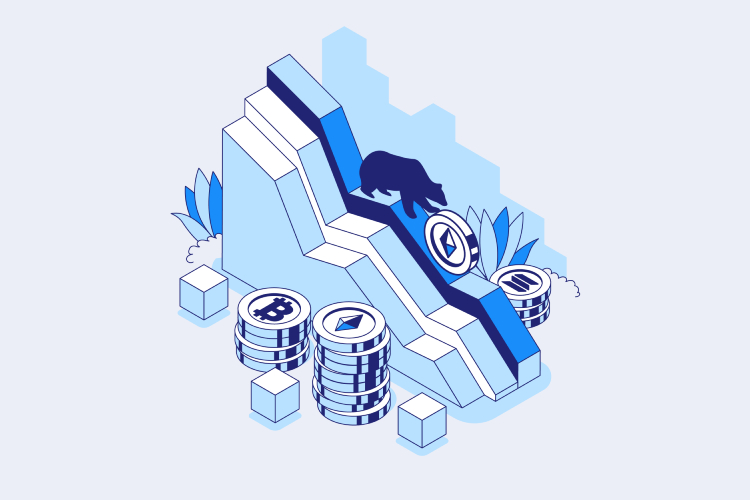A bear market is often associated with the overall market’s decline or an index such as the S&P 500, but it can also refer to specific commodities or securities. They can also be associated with economic declines such as a recession.
Companies that do not have a solid financial foundation can potentially face serious problems in the next few months or even years. Depending on how long the problem lasts, it could affect the job market or job security.
What is the significance of a bear market?
A bear market could indicate an impending recession, but there is no perfect match. Since World War II, there have been three out of twelve bear markets that were not preceded by an economic recession.
An economic downturn is a bad thing for anyone investing, whether it is a direct investment in Apple or Tesla, or a 401(k) investment. The impact is especially hard on retirees who have just retired and watch their nest eggs shrink when they have to start taking money out of them.
In addition, entering an economic downturn can affect the psychological state of investors, which can trigger a self-fulfilling cycle. The perception of a bear market can cause investors to sell more stocks, pushing prices down and prolonging the suffering.

What are the causes of a bear market?
The reasons can be many, however in general, a slowing or weakening economy, as well as factors such as disease outbreaks, wars or burst bubbles, can play a role in the market.
How often do bear markets happen?
There are not many bear markets. The last one occurred in the U.S. market during the period of the pandemic COVID -19 in early 2020.
Other notable types of bear markets are after the dot-com bubble’s collapse in 2000 and during the Great Depression in the 1920s.
How do you invest in a bear market?
Bear markets are stressful for investors. And no one likes to watch their investments fall sharply. However, there are ways to make money in the long run, even when the market trades at a reduced price.
With that in mind, there are some principles you can follow to invest the right way in bear markets:
Take the Long-Term Perspective: One of the most dangerous actions you can take during a bear market is to react reflexively to market changes. The average investor significantly underperforms the overall market over the long term. The main reason is getting in and out of stocks too quickly.
When stocks fall and look like they will keep falling, our instinct is to buy before things get worse. And when the market is in a bull market, and stocks continue to soar, we hesitate to put our money in so we do not miss out on the gains.
We all know that investing should be to buy low and sell high. However, reacting emotionally to market fluctuations, you do the opposite. Make sure that you invest in stocks that you want to hold for the long term. Please do not mistake selling them because they fell during a bear market.
Focus on quality: When a bear market hits, companies are often driven out of business. Debt-ridden companies or companies without competitive advantages are usually the most targeted when the economy is doing poorly, while prominent companies tend to do better.
In uncertain times, focusing on companies with strong balance sheets and clearly defined, solid, and durable advantages in the marketplace is critical.
Do not try to find the bottom: Trying to anticipate the market is usually unsuccessful. Remember about a bear market is that you probably will not invest at the bottom. Buy stock because you want to be in the company long-term, even if the stock price drops a little after you buy it.
Build up your positions over time: This is related to the previous point. Rather than spotting the bottom and then investing all your cash at once in a bear market, it is better to gradually build up your stock positions, regardless of whether you think prices are as low as they can go.
If you are not right and the price continues to fall and fall, you will have a chance to profit from the lower prices instead of waiting.
How long will these bear markets last?
The good news is that the market has recovered from every downturn.
A typical bear market lasts 359 days, and it can take up to 38 months to go from the bottom of a market to the highest level ever. Coping with such a long period is stressful, and it may be beneficial for certain investors to break away from regularly checking their account balances.
Bear vs. bull
A bull market is the opposite of an economic downturn. They occur whenever stock prices rise steadily and are often supported by increased consumer confidence, low unemployment and robust economic growth.
Generally, a bull market can be defined by a percentage increase in value over the lows of a bear market. However, the definition of a bull market is not as precise as that of a bear market. Investors usually determine the beginning of a bull market at the low point of a bear market. For example, the S&P 500 bottomed in March, which was the beginning of the bear market, which lasted until early 2020.
To be precise, two key things need to happen before a new bull market is declared: a 20% rise from the recent bear market lows and new all-time highs in benchmark indices.
Conclusion
A bear market can be a traumatic experience, but it is generally temporary. Although it may seem easy to sell during a bear market, timing the market can be difficult for even the most experienced investors. Therefore, the most important thing an investor can do is choose high-quality long-term investments and keep an eye on investments that require attention, such as growth stocks and potentially risky assets.
A steady decline in stock prices (more than 20 percent) should not cause investors to panic, as the market will likely regulate itself over the long term.
Investing in funds allows individuals to avoid short-term losses and realize long-term gains (through both long-term dividends and capital gains) as the economy automatically adjusts and investors perceive favorable growth prospects.
A rise in stock prices can pull an economy out of recession. It can also enable robust growth thanks to higher production and increased GDP.





